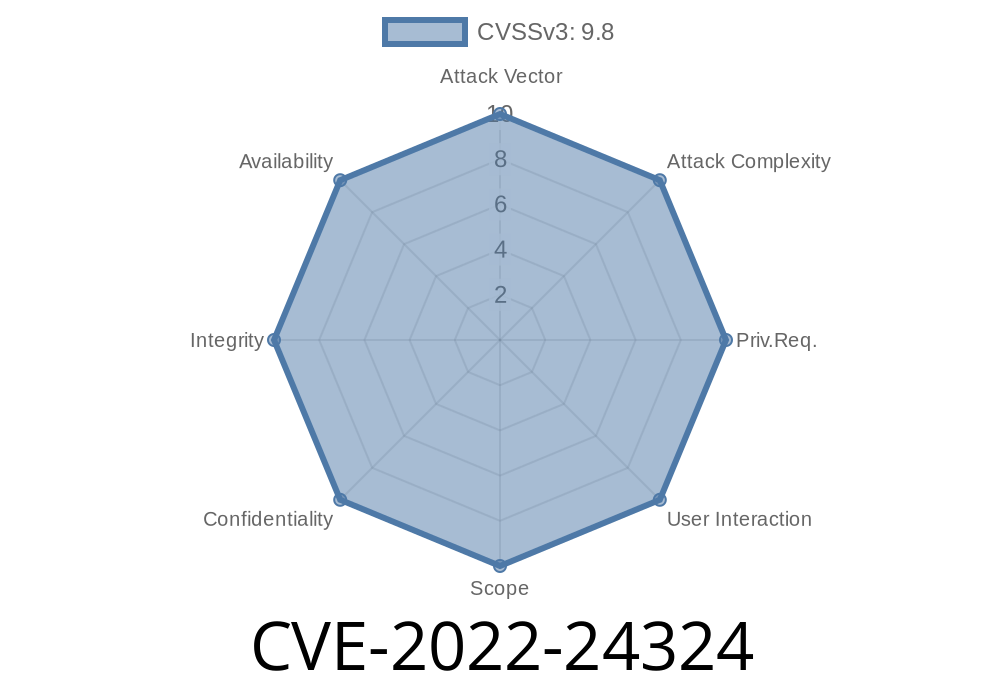In early 2022, the cybersecurity community discovered a serious vulnerability—CVE-2022-24324—affecting the IGSS Data Server, a popular platform used for industrial control systems. This flaw, identified as CWE-120 (“Buffer Copy without Checking Size of Input”), allows an attacker to send a specifically crafted message that can lead to a stack-based buffer overflow, potentially resulting in Remote Code Execution (RCE).
Let’s break down what happened, how it works, and why it matters, using clear language and real code snippets.
What is IGSS Data Server?
The IGSS (Interactive Graphical SCADA System) Data Server is software used by many industrial facilities to monitor and control equipment. Like other SCADA systems, it is a crucial part of operational technology with a focus on reliability—and, as we will see, sometimes at the expense of security.
Affected versions:
What is CWE-120?
CWE-120 is all about unsafe copying of input data into buffers without any checks on the size. If the input is too big for the buffer, it "overflows" into other parts of the memory—often with dangerous consequences. Malicious actors can exploit this to hijack the program's flow and even inject their own code.
What’s the Actual Issue in CVE-2022-24324?
The core problem is simple: the IGSS Data Server copies user inputs to a fixed-length buffer without proper bounds checking. This makes it possible for an attacker to overwrite critical memory regions, which could then let them run arbitrary code on the machine running the Data Server—remotely, by sending a network message.
In other words: send a specially crafted message, and you might get to run your own code on someone else’s machine.
Visualizing the Vulnerable Code
The following C/C++-like pseudocode shows the issue. Suppose we have a buffer of 256 bytes, but we use strcpy to copy an incoming message without checking its length:
// Vulnerable code snippet in IGSSdataServer.exe
char buffer[256];
// 'msg' comes from the network, size not checked!
strcpy(buffer, msg);
// ... buffer now contains user-supplied data, possibly overflowing
If msg is longer than 256 bytes, it will overflow buffer and overwrite other variables, return addresses, or function pointers, which can be abused by attackers.
Safe Alternative:
// Safe version using strncpy
strncpy(buffer, msg, sizeof(buffer) - 1);
buffer[sizeof(buffer) - 1] = '\'; // Ensure null-termination
Find the Target: Locate an unpatched IGSS Data Server running a version before V15...22073.
2. Send Malicious Data: Craft a network message that is longer than the expected buffer size—typically, just spam 300+ bytes of controlled data.
3. Trigger Overflow: The server receives your message, copies it using vulnerable code, and the buffer overflows.
4. Control the Flow: If you control what gets written after the buffer, you might overwrite the return address or function pointer, making the server execute your instructions (shellcode).
> Proof-of-concept exploit scripts are generally not public for industrial targets, but conceptually, a Python script sending a TCP packet with long payload suffices for DoS or even RCE if protections (stack canaries, DEP, ASLR) are absent or weak.
Example (conceptual, do not use remotely)
import socket
host = 'TARGET_IP'
port = 12345 # change to actual IGSS port
payload = b'A' * 300 # overflowing the buffer
s = socket.socket()
s.connect((host, port))
s.sendall(payload)
s.close()
Real-World Impact
A successful exploit means remote code execution as the user running IGSS Data Server—often a privileged account on a critical industrial machine. Attackers could:
Restrict Network Access: Isolate IGSS servers from the public internet using firewalls.
3. Monitor for Exploit Attempts: Watch for suspicious, oversized packets directed at your IGSS server.
4. Follow Vendor Security Alerts: Regularly review advisories from Schneider Electric.
References & Further Reading
- Official Schneider Electric Security Notification: SEVD-2022-040-02
- MITRE CWE-120: Buffer Copy without Checking Size of Input
- CVE-2022-24324 Entry at NIST NVD
- US-CERT ICS Advisory (ICSA-22-040-03)
Conclusion
CVE-2022-24324 is a textbook example of how a simple programming oversight—failing to check how much data comes in—can endanger critical industrial systems. If your infrastructure still uses an unpatched IGSS Data Server, update now. These bugs are surprisingly easy to exploit, and as history teaches us, attackers gravitate to the weakest links.
Timeline
Published on: 02/01/2023 04:15:00 UTC
Last modified on: 02/08/2023 15:58:00 UTC
